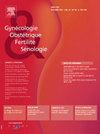Profils et motivations des femmes demandeuses d’autoconservation ovocytaire en France : enquête sur deux ans
IF 0.6
4区 医学
Q4 OBSTETRICS & GYNECOLOGY
引用次数: 0
Abstract
Objectives
The new bioethics law of August 2, 2021 allows French women to self-preserve.
Methods
National observational survey over 2 years based on an online questionnaire conducted under the aegis of GEDO (Groupe d’études pour le don d’ovocytes).
Results
The average age of the 282 women who answered the questionnaire, 34.5 years, is consistent with the benefit/risk balance described in the literature. The most educated women, also very vulnerable, remain the most affected. They are single and childless, but most of them see themselves as a couple and want to become mothers in the future. Their main motivation is to have the choice to postpone a pregnancy without fear of infertility until they have found a suitable partner. Careerist or selfish motivations are anecdotal. The projected fate of unused vitrified oocytes is above all donation to others.
Conclusion
This study shows that oocyte self-preservation is undeniably experienced as a societal victory and is perceived as a step towards gender equality. While oocyte self-preservation is not an absolute guarantee of having a future child, it is part of a primary preventive strategy for age-related fertility decline. Public authorities and health professionals will have to widely disseminate accurate and complete information to allow everyone to have access to an informed reproductive choice.
[法国女性寻求卵母细胞保存的概况和动机:一项为期两年的调查]
目标:2021年8月2日的新生物伦理法允许法国女性自我保存方法。在GEDO (Groupe d‘Études pour le Don ’ ovocytes)的支持下,通过在线问卷进行了为期2年的全国观察性调查。结果:282名回答问卷的女性的平均年龄为34.5岁,与文献中描述的利益/风险平衡一致。受教育程度最高的妇女,也非常脆弱,仍然是受影响最大的。她们是单身,没有孩子,但她们中的大多数人把自己看作是一对夫妇,并希望在未来成为母亲。她们的主要动机是可以选择推迟怀孕,而不用担心不孕不育,直到找到合适的伴侣。野心家或自私的动机是传闻。未使用的玻璃化卵母细胞的预期命运首先是捐赠给他人。结论:这项研究表明,卵母细胞的自我保存是不可否认的社会胜利,被认为是迈向性别平等的一步。虽然卵母细胞的自我保存并不能绝对保证将来有一个孩子,但它是预防与年龄有关的生育能力下降的主要策略的一部分。公共当局和保健专业人员必须广泛传播准确和完整的信息,使每个人都有机会获得知情的生殖选择。
本文章由计算机程序翻译,如有差异,请以英文原文为准。
求助全文
约1分钟内获得全文
求助全文
来源期刊

Gynecologie Obstetrique Fertilite & Senologie
Medicine-Obstetrics and Gynecology
CiteScore
1.70
自引率
0.00%
发文量
170
期刊介绍:
Gynécologie Obstétrique Fertilité & Sénologie est un mensuel scientifique d''information et de formation destiné aux gynécologues, aux obstétriciens, aux sénologues et aux biologistes de la reproduction. La revue, dans ses éditoriaux, articles originaux, mises au point, lettres à la rédaction et autres rubriques, donne une information actualisée ayant trait à l''obstétrique et à la gynécologie et aux différentes spécialités développées à partir de ces deux pôles : médecine de la reproduction, médecine maternelle et fœtale, périnatalité, endocrinologie, chirurgie gynécologique, cancérologie pelvienne, sénologie, sexualité, psychosomatique…
 求助内容:
求助内容: 应助结果提醒方式:
应助结果提醒方式:


